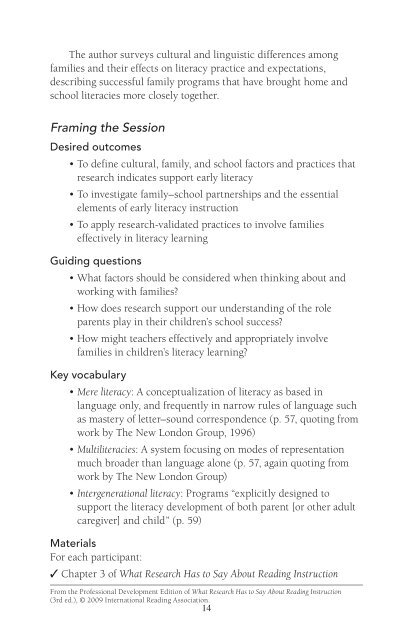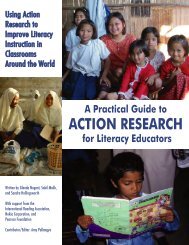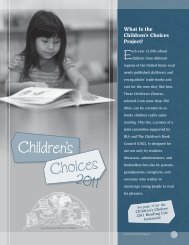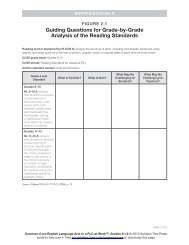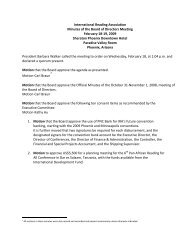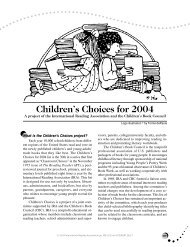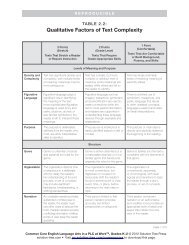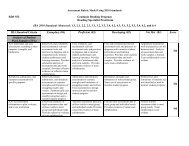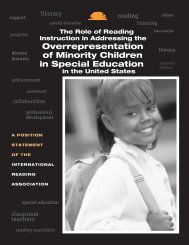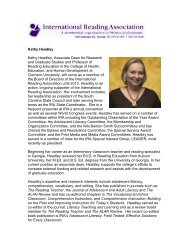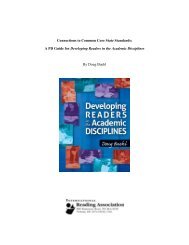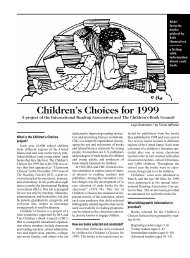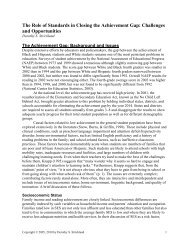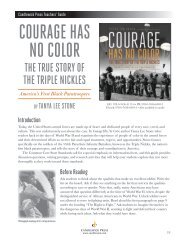What Research Has to Say About Reading Instruction - International ...
What Research Has to Say About Reading Instruction - International ...
What Research Has to Say About Reading Instruction - International ...
Create successful ePaper yourself
Turn your PDF publications into a flip-book with our unique Google optimized e-Paper software.
The author surveys cultural and linguistic differences among<br />
families and their effects on literacy practice and expectations,<br />
describing successful family programs that have brought home and<br />
school literacies more closely <strong>to</strong>gether.<br />
Framing the Session<br />
Desired outcomes<br />
• To define cultural, family, and school fac<strong>to</strong>rs and practices that<br />
research indicates support early literacy<br />
• To investigate family–school partnerships and the essential<br />
elements of early literacy instruction<br />
• To apply research-validated practices <strong>to</strong> involve families<br />
effectively in literacy learning<br />
Guiding questions<br />
• <strong>What</strong> fac<strong>to</strong>rs should be considered when thinking about and<br />
working with families?<br />
• How does research support our understanding of the role<br />
parents play in their children’s school success?<br />
• How might teachers effectively and appropriately involve<br />
families in children’s literacy learning?<br />
Key vocabulary<br />
• Mere literacy: A conceptualization of literacy as based in<br />
language only, and frequently in narrow rules of language such<br />
as mastery of letter–sound correspondence (p. 57, quoting from<br />
work by The New London Group, 1996)<br />
• Multiliteracies: A system focusing on modes of representation<br />
much broader than language alone (p. 57, again quoting from<br />
work by The New London Group)<br />
• Intergenerational literacy: Programs “explicitly designed <strong>to</strong><br />
support the literacy development of both parent [or other adult<br />
caregiver] and child” (p. 59)<br />
Materials<br />
For each participant:<br />
✓ Chapter 3 of <strong>What</strong> <strong>Research</strong> <strong>Has</strong> <strong>to</strong> <strong>Say</strong> <strong>About</strong> <strong>Reading</strong> <strong>Instruction</strong><br />
From the Professional Development Edition of <strong>What</strong> <strong>Research</strong> <strong>Has</strong> <strong>to</strong> <strong>Say</strong> <strong>About</strong> <strong>Reading</strong> <strong>Instruction</strong><br />
(3rd ed.), © 2009 <strong>International</strong> <strong>Reading</strong> Association.<br />
14


